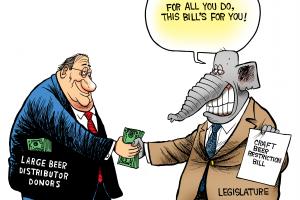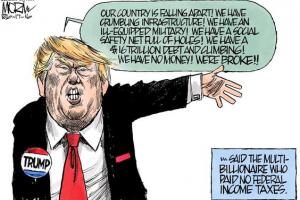To a Cigarette Maker, Your Life Is Worth About $10,000
Nautilus
 Three women, all clearly desperate for jobs, arrive for "orientation" at the work room of a meat processing plant. They have been sent by an employment agency as "temporary workers" - a euphemism for low wages, no benefits, short-term contracts with uncertain payroll dates and the most appalling work conditions. So begins Alexander Zeldin's remarkable "immersive" soul-stripping production of "Beyond Caring."
Three women, all clearly desperate for jobs, arrive for "orientation" at the work room of a meat processing plant. They have been sent by an employment agency as "temporary workers" - a euphemism for low wages, no benefits, short-term contracts with uncertain payroll dates and the most appalling work conditions. So begins Alexander Zeldin's remarkable "immersive" soul-stripping production of "Beyond Caring."
 By reorganizing Science for the People, we aim to revitalize its legacy of documenting the use and abuse of science and to organize scientists to contribute to human liberation and transformative social change. As a coalition of progressive and radical science workers and supporters, Science for the People finds the alternatives of “science for science’s sake” and “science for the progress of capitalism” equally unacceptable.
By reorganizing Science for the People, we aim to revitalize its legacy of documenting the use and abuse of science and to organize scientists to contribute to human liberation and transformative social change. As a coalition of progressive and radical science workers and supporters, Science for the People finds the alternatives of “science for science’s sake” and “science for the progress of capitalism” equally unacceptable.
 Public-private partnerships may indeed provide the dollars that fearful politicians are unable to pry from the pockets of their tax-averse constituents. But P3s, as they are known in the infrastructure sector, are more complex than they appear. The idea that P3s allow infrastructure to be built for free is economic snake oil, P3s do not end up saving taxpayers money, especially when policymakers obscure the true costs and the risks.
Public-private partnerships may indeed provide the dollars that fearful politicians are unable to pry from the pockets of their tax-averse constituents. But P3s, as they are known in the infrastructure sector, are more complex than they appear. The idea that P3s allow infrastructure to be built for free is economic snake oil, P3s do not end up saving taxpayers money, especially when policymakers obscure the true costs and the risks.
 Raising consciousness about capitalism’s predations, even in beer, could encourage a movement to socialize brewing. In a democratically managed economic system, the freewheeling ethos of the microbrew movement would be free to flourish without being blackballed out of the market by the majors, or bought out if they manage to succeed. Now that would be a happy hour!
Raising consciousness about capitalism’s predations, even in beer, could encourage a movement to socialize brewing. In a democratically managed economic system, the freewheeling ethos of the microbrew movement would be free to flourish without being blackballed out of the market by the majors, or bought out if they manage to succeed. Now that would be a happy hour!
 Among the report’s key findings: 100 companies enjoyed at least one year in which their federal income tax was zero or less, 24 companies paid zero taxes in four out of eight years, 18 companies paid no federal income tax over the eight-year period, Collectively, the 258 corporations enjoyed $513 billion in tax breaks over the last eight years. More than half of those tax breaks, $277 billion, went to just 25 of the most profitable corporations.
Among the report’s key findings: 100 companies enjoyed at least one year in which their federal income tax was zero or less, 24 companies paid zero taxes in four out of eight years, 18 companies paid no federal income tax over the eight-year period, Collectively, the 258 corporations enjoyed $513 billion in tax breaks over the last eight years. More than half of those tax breaks, $277 billion, went to just 25 of the most profitable corporations.
Spread the word